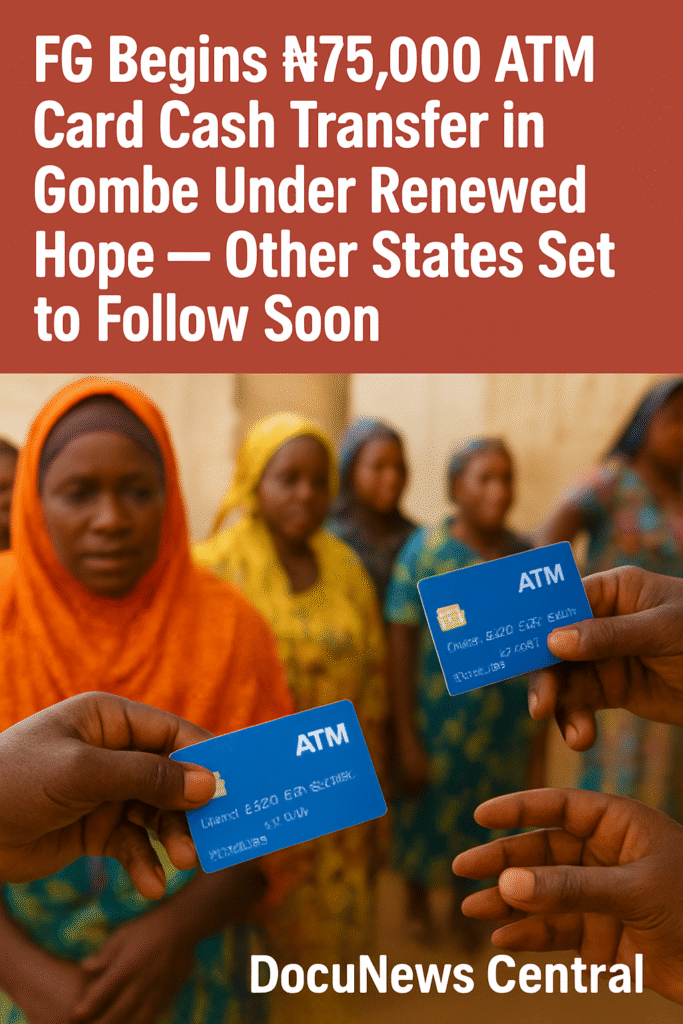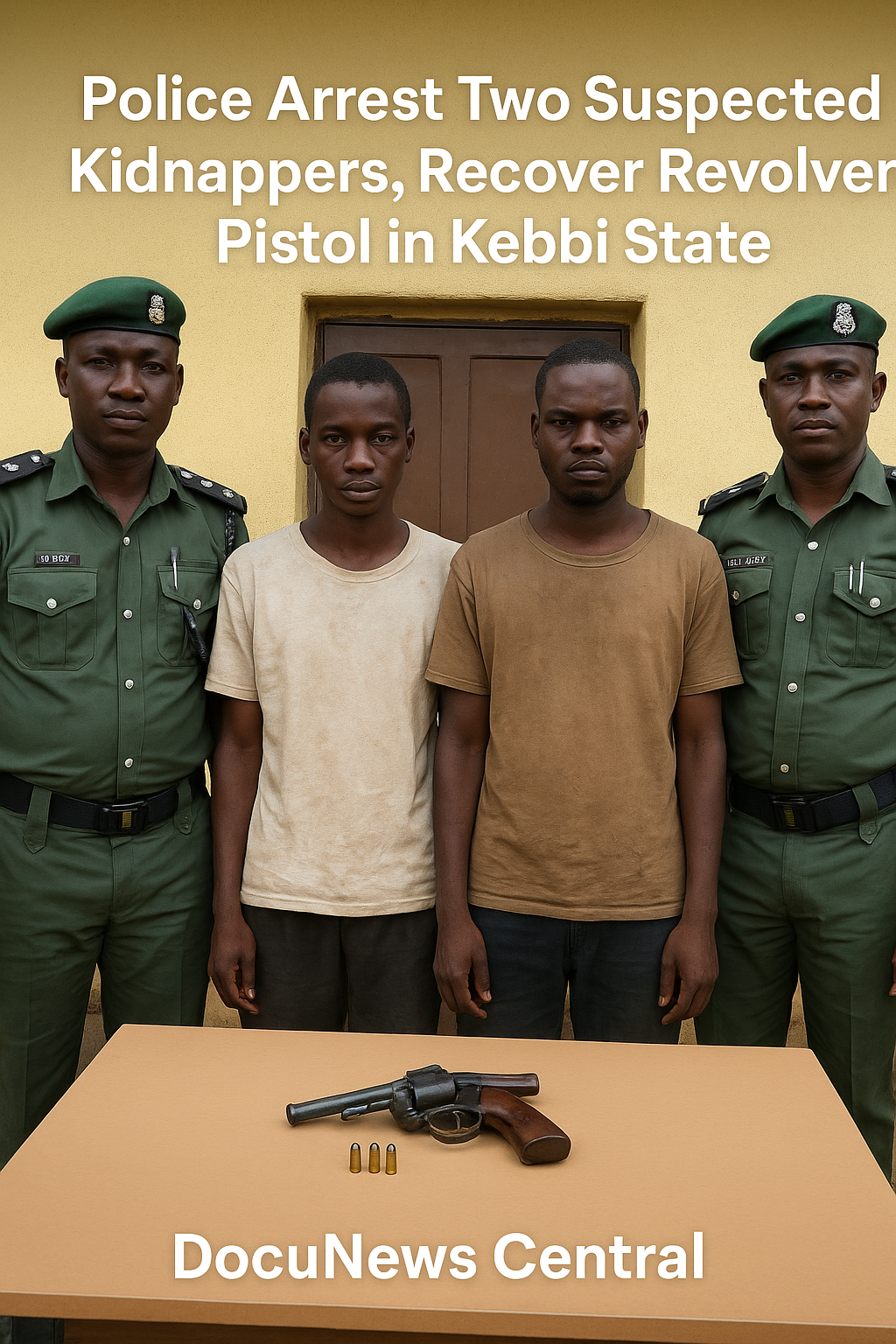
FG Begins ₦75,000 ATM Card Cash Transfer in Gombe Under Renewed Hope — Other States Set to Follow Soon
The Federal Government of Nigeria has started the distribution of ATM cards linked to the ₦75,000 conditional cash transfer programme. The launch began in Gombe State, where beneficiaries lined up to collect their cards and receive their first support package under the Renewed Hope Agenda.
The programme will gradually spread to other states. Officials have assured Nigerians that all 36 states and the Federal Capital Territory (FCT) will be covered. Beneficiaries are expected to collect their ATM cards in phases, with the government promising a transparent and fair process.
For those who want to register or confirm if their names are on the list, the government has provided official websites that Nigerians should use. These are the only platforms recognized for information on the programme.
Launch in Gombe State
The first phase was flagged off in Jekadafari Darazawa Quarters, Gombe State. Large crowds of residents arrived to pick up their new ATM cards. Each card comes preloaded with ₦75,000, covering three months of payments at ₦25,000 per month.
Officials from the National Cash Transfer Office (NCTO), under the Federal Ministry of Humanitarian Affairs and Poverty Alleviation, supervised the exercise. Community leaders were also present to ensure transparency.
One of the most moving scenes was when elderly citizens and widows, who had never owned an ATM card before, received theirs. For many, it was not just financial relief but also a moment of dignity.
The Aim of the Programme
The Renewed Hope Conditional Cash Transfer Programme is designed to bring relief to Nigeria’s most vulnerable citizens. It targets poor households who are struggling under the weight of high inflation, rising food prices, and the removal of fuel subsidy.
Instead of giving one-time food items, the government is handing out direct cash support. Beneficiaries can decide how to spend the money—whether on food, rent, school fees, health care, or small business activities.
The programme is meant to reduce extreme poverty and give struggling families the means to take care of their most urgent needs.
Where to Register or Verify Status
Nigerians are advised to be careful with fake links, social media forms, or WhatsApp messages that promise easy registration. The Federal Government has listed official platforms where people can check or verify information. These are:
- National Social Safety-Net Coordinating Office (NASSCO)
Website: www.nassp.gov.ng - National Cash Transfer Programme (through NASSCO portal)
Website: www.nassp.gov.ng/national-cash-transfer-programme - Federal Ministry of Humanitarian Affairs and Poverty Alleviation (FMHAPA)
Website: www.fmhds.gov.ng
These three websites are the only reliable channels for information. Anyone claiming to register people outside these platforms is likely running a scam.
How the ₦75,000 Will Be Withdrawn
Beneficiaries will not be handed physical cash during distribution. Instead, they receive ATM cards connected to their bank accounts. Once activated, the money can be withdrawn safely from banks and ATMs across the country.
Some of the banks that will process withdrawals include:
First Bank of Nigeria
Access Bank
Zenith Bank
United Bank for Africa (UBA)
Guaranty Trust Bank (GTB)
FCMB (First City Monument Bank)
Union Bank
Other licensed commercial banks with ATM and POS services will also be available for cardholders. This ensures that beneficiaries can withdraw their ₦75,000 even in rural areas with limited bank branches.
Who is Eligible?
Not every Nigerian is qualified to receive the ₦75,000 support. The programme is strictly for:
Households already registered as poor and vulnerable.
Widows and single mothers struggling to feed their children.
Elderly citizens with no steady income.
Persons with disabilities.
Unemployed youths in poor households.
Community targeting was used to identify eligible households. Local leaders and welfare officers provided lists to ensure that the poorest were selected.
Why ₦75,000?
The ₦75,000 payment represents three months of support at ₦25,000 per month. Instead of paying monthly, the government decided to release the total amount at once.
The idea is to give families more flexibility. Some may use it for bulk food purchase, others may invest in petty trading, farming, or equipment for small businesses.
Rollout in Other States
After Gombe, the programme is moving to other states. Already, Adamawa State has announced its own distribution between July 20 and July 26, 2025. All 21 local government areas in Adamawa will be covered during that week.
Other states are preparing to launch. Officials say the goal is to cover the entire country before the end of 2025. This phased distribution allows for proper planning, verification, and prevention of fraud.
Transparency and Monitoring
The government has promised that this programme will not be hijacked. By using ATM cards, the system eliminates cash handling during distribution. Every withdrawal is traceable through the banking system.
Civil society organizations and international partners have also been invited to monitor. This reduces corruption and gives the public more confidence in the process.
Voices from Gombe
Beneficiaries in Gombe expressed excitement and relief.
A widow said she would use part of the money to pay her child’s school fees.
An elderly man explained that this was the first ATM card he had ever owned, adding that it made him feel respected.
A young mother shared that she planned to invest part of the money in a small business to support her family.
These stories show how the ₦75,000 cash support can make a real difference in people’s daily lives.
Economic Benefits
Experts believe the programme can have a multiplier effect on the economy. As families spend their ₦75,000 in local markets, traders, farmers, and transport operators all benefit. This cycle of spending and earning can help boost local economies, especially in rural areas.
While the amount cannot solve poverty, it can ease the burden on households and create small business opportunities.
Possible Challenges
Like any large programme, challenges may arise:
Some elderly people may not know how to use ATM cards.
Rural areas with few bank branches may face difficulties.
Poor electricity and network service could cause ATM issues.
Fraudsters may try to trick people with fake websites.
Politicians may try to take advantage of the scheme.
To solve these issues, the government is working with NGOs and local officials to provide support and education on how to use ATM cards.
Lessons from the Past
Nigeria has tried cash transfer schemes before. Some of them failed because of poor records, corruption, or delayed payments.
This time, improvements have been made. The use of ATM cards and official banking systems reduces fraud. The reliance on the national social register also means beneficiaries are better identified.
Nigeria’s Poverty Challenge
Nigeria has more than 70 million people living in extreme poverty. This programme is not a permanent fix but it offers short-term relief.
Experts believe cash transfers are better than random food palliatives. With cash, families can decide their own priorities—whether food, education, or small business investment.
Mixed Political Reactions
The programme has generated both support and criticism.
Supporters praise it as a practical way to reduce suffering.
Critics argue that ₦75,000 is too small given the rising cost of living.
Others worry that it could be politicized.
Despite these debates, the cash transfer is already providing relief to thousands of families.
Advice for Nigerians Waiting
Nigerians should keep these points in mind:
- Only use the official portals:
www.nassp.gov.ng
www.nassp.gov.ng/national-cash-transfer-programme
www.fmhds.gov.ng
- Stay informed through local government offices and community leaders.
- Never pay anyone to register you. The programme is free of charge.
- Keep your identification documents (NIN, BVN, voter’s card) ready.
- Be patient and wait for your state’s official distribution date.
Closing Remark
The launch of the ₦75,000 cash transfer programme in Gombe is a milestone in Nigeria’s fight against poverty. By using ATM cards, trusted banks, and official registration portals, the government is showing a commitment to transparency and accountability.
As other states prepare to follow, millions of households will soon benefit. While ₦75,000 may not end poverty, it provides real hope and relief for struggling families under the Renewed Hope Agenda.
📢 Stay Updated with DocuNews Central
For verified news and real-time updates on the ₦75,000 cash transfer rollout, follow the official DocuNews Central Facebook page — DocuNews Central.









First God bless Docunews central for helping disseminate this information.
This will really go a long way to help reduce hunger especially to the Vulnerable and people with disabilities. I support this project
Thank you so much you really appreciate you for engaging without thanks and please do share our news with others we love you
Am salisu Muhammad from GOMBE state
Did you Receive your own ATM card?